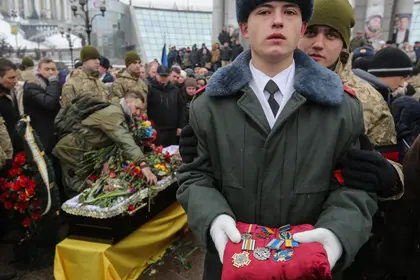AVDIYIVKA, Ukraine – Nadia Volkova collapses to her knees atop the blood-stained snow and examines the body of her 60-year-old mother, Katya. Bricks keep the winter breeze from blowing a patterned blanket off the shrapnel-riddled corpse.
Volkova, 24, strokes her mother’s arm, her body trembling, her bloodshot eyes welling with tears. She waits for a coroner to take the body away.
War returned with a fury four days ago to the eastern Ukrainian city of Avdiyivka, home to the Avdiyivka coke plant and 700 kilometers southeast of Kyiv in Donetsk Oblast.
- Access the latest Ukraine news coverage for today.
- Access the latest Ukraine news coverage for today.
JOIN US ON TELEGRAM
Follow our coverage of the war on the @Kyivpost_official.
On Feb. 1, around 7:30 a. m., a salvo of rockets rained down on the city with now just 22,000 people, down from a pre-war high of 35,000 residents.
Katya Volkova, a mother and grandmother, was killed on the road from her house as she walked to the market.
Nearly three years since first erupting, the war here in eastern Ukraine has exploded anew, with deadly fighting between government forces and Russia-backed separatists reported up and down the 450-kilometer front line.
Avdiyivka has been hit the hardest. Since Jan. 28, day and night, outgoing and incoming artillery salvos have been almost ceaseless. The industrial city has been transformed into a place of broken glass and mourning, where armored vehicles clog traffic and soldiers outnumber locals on the streets.
In intensity and bloodshed, the new fighting has echoes of another battle two years ago – for Debaltseve.
That fight, for the strategic railway junction 70 kilometers northeast of here, ended in the deaths of hundreds of Ukrainian soldiers after they were encircled by Russian troops and their separatist proxies.
It led to a peace deal known as the Minsk II agreements that has led to nothing resembling peace.
But Avdiyivka is not that bad, says Petro Ivanovich, who was awoken overnight to the sound of rockets crashing into the schoolyard adjacent to his apartment building.
“It’s not Debaltseve. Not yet,” says Petro, who like many residents gave only his first and middle names. The dark craters and the shrapnel spray from them easily stand out in the snow.
The empty field looks like a moonscape.
In all, at least 10 civilians and fighters on both the government and Russia-backed separatist sides have been killed since Jan. 29. The Ukrainian military said two more soldiers died in fighting overnight, and at least two more were wounded. It was unclear if the new casualties were included in the updated death toll.
On the separatists’ side, no casualty figures have been announced, though a top commander confirmed the deaths of three fighters, including a fellow commander.
Residents say both sides are to blame.
Nearly two dozen homes were roofless due to the shelling, Ukraine’s National Security and Defense Council chief Oleksandr Turchynov told RFE/RL during an impromptu visit on Feb. 1.
But nearly the entire city was without electricity and heat as temperatures plunged to minus 18 degrees Celsius.
The Avdiyivka coke plant, the largest employer in the city, turns coal into coke, but also has a heating unit that keeps much of the city warm.
General Director Musa Magomedov says his 4,000 employees are working overtime trying to keep the city heated. But he says the plant is working at only 20 percent capacity after shelling knocked out the electricity.
If the plant were to shut down, Magomedov says, the city would empty out.
At a pop-up humanitarian-aid station, more than 2,000 people lined up at midday for soup, bread, and rations at field kitchens operated by soldiers. Scores squeezed into a warming tent meant to hold only a couple dozen.
Emergency official Vladislav Husinskyy said 175 people, including 88 children, have evacuated to nearby cities since morning. By nightfall, the number will increase as buses from nearby cities of Svyatohirsk and Mariupol arrive.
Not everyone wants to or can afford to leave, however.
As she waves goodbye to a neighbor, pensioner Alla Aleksandrovna says she will stay to look after her daughter and granddaughter. The three of them survive on her $48-per-month pension and live in her paid-for apartment.
“We have survived, and we will survive,” she says.
Others aren’t so sure.
Pavlo Zhebrivskyy, the chain-smoking Donetsk regional governor, tells a crowd of mostly elderly women in sheepskin jackets and fur hats that the authorities are working to restore electricity and heating to the city. He is repeatedly heckled.
“But what about the shelling?” one woman shouts.
“Yes, how are we supposed to sleep at night?” another screams.
“What we need is an end to this war,” another yells. “We are being slaughtered!”
You can also highlight the text and press Ctrl + Enter




